Category — Life
The voice(s) we listen to

Most nights I go to sleep listening to a mediation I choose from InsightTimer. There are thousands to choose from on this (free) app, including way too many recorded by men with Australian accents (so not restful) and way too many recorded by women with whispery voices (just annoying) and more than a handful that are over-the-top woo-woo (I do not need to visit the Astral plain, thank you very much). But there are also some lovely, thoughtful, deep-breath-inducing reflections that help create the calm space between awake and asleep. I love that space. I may love it more than sleep itself.
Many of the mediations I listen to ask you to think of a sankalpa, the Sanskrit word for intention. (San means “to become one with” and kalpa means “time” and “subconscious mind.”) And no, I didn’t know that. I looked it up. A sankalpa is a way to set intention. It puts into words—a simple declarative sentence—what you need or want or aspire to. But the “secret” is that it is expressed as, essentially, a done deal rather than a “gee, I hope…” statement. So, for example, if a certain person who will remain nameless (well, okay, not so nameless) had a rough, emotionally challenging day and is concerned that she will have trouble clearing her head and falling asleep, the sankalpa would be expressed “I will enjoy a deep and restful sleep” and not “I hope I can get to sleep tonight.”
Consider the difference between those two statements. One is optimistic and empowering. The other already sets you back on your heels and reinforces the difficulties you are imagining.
I have been sankalpa-ing for a while now, but just this morning I put together this practice with what I’ve learned about the “saboteurs”—that cacophony of inner critics who are determined to tell us what we can’t do, what we shouldn’t do, or what we should do that we shouldn’t do. Having a sankalpa allows you to catch those negative thoughts, then work on replacing them with this positive statement.
Believe it not, the sankalpa talks louder than the saboteur.
March 29, 2023 No Comments
What did you say?

If I work hard enough I can control any situation.
I am worthy as long as I am successful
When is the other shoe gonna drop?
No one understands me.
Ah yes, those voices inside our heads. Okay, my head. You too? Maybe not these voices but others? That voice that tells you have to be perfect. That voice that tells you to avoid conflict and therefore mask your feelings. That voice that tells you receiving help means being helpless.
Do not worry, my friends., I have not morphed into a spouter of self-help gobbledegook. I am not about to (gasp) write a book about any of this. The shelves are groaning with books like this.
But I am interested in this take on those sabotaging voices inside our heads by the “positive intelligence” training guru and, yes, best-selling author, Shirzad Chamine, a Stanford lecturer and Fortune 500 corporate coach. By the way, you might consider not buying his book. He does not need your money.
Speaking Fee:
Live Event Fee: $30,000 – $50,000
Virtual Event Fee: $10,000 – $20,000
But you can take his “Saboteur Assessment” test for free—and you might learn something about yourself. Or, like me, nod your head in agreement about what you already know about yourself. Because those (potentially) sabotaging voices are so very familiar.
Can I (we) just stop listening? I doubt it. (Oh no, is that one of my saboteurs talking to me?) I do think that by naming these voices—Charmine identifies 10—we can at least recognize what they are doing, or the dark and unproductive places they “illuminate” for us. And then…Reason with them? Shout them down? Stuff a sock in their mouth?
Here are the nasty little beings making noise inside your (my) head. Tell them to shut the fuck up. (That’s probably not the advice what Shirzad Charmine charges $50,000 for.) Mine is free!
- Judge
- Controller
- Hyper-achiever
- Restless
- Stickler
- Pleaser
- Hyper-vigilant
- Avoider
- Victim
- Hyper-rational
March 22, 2023 6 Comments
I go to the woods
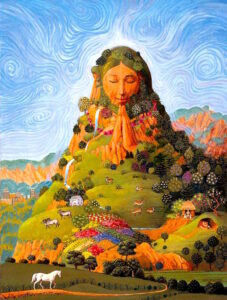
“It is a serious thing just to be alive on this fresh morning in this broken world.”
— Mary Oliver, Invitation
We all go someplace to work things out: a favorite chair next to a window, the arms of a loved one, the kitchen, the garden, the ocean, some exotic somewhere with frangipani-scented air.
Me? I go to the woods. Or the mountains. Near or far. I go for hard hikes that make me sweat. I pound whatever needs to be pounded into the earth, Mother Earth, Pachamama. You know, the Stuff of Life: grief, hurt, anger, fear. She takes it and remakes it. And almost always this works. I return lighter, sometimes even (if only temporarily) enlightened. I return with this Mary Oliver line in my head.
And also, of course, and predictably, Wendell Berry: “For a time/ I rest in the grace of the world and I am free.”
Today I am tired from a hard day of mountain hiking in the snow at 6,000 feet. It’s the good kind of tired. I am scoured clean of dark thoughts. Of all thoughts. Thus I offer these images I made (as photographers are supposed to say, not “pictures I took”) of places–near and far– that have both challenged me and offered me solace, places where I have felt free and joyful.
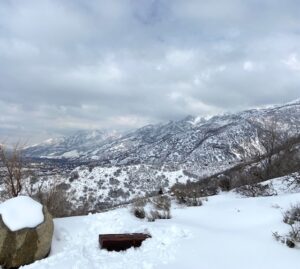
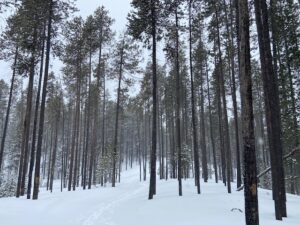
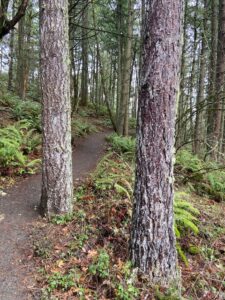
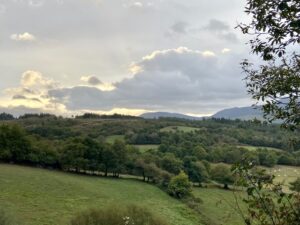
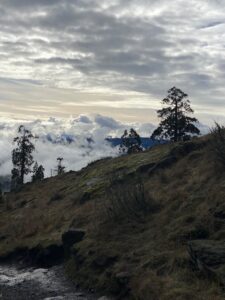
March 8, 2023 4 Comments
Seasons of life. Not.
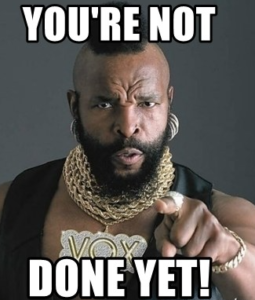
This one isn’t about the Camino.
Or maybe it is. Ever since I returned from that 36-day trek across northern Spain, it seems that everything, somehow, is tied to that experience, from my restlessness when a day goes by without a hard hike to my obsession with pimientos de padron, from my habit of waking before dawn to the vitality I feel as I explore a new relationship.
“I’m not done yet” is what I said to myself—and out loud—when I returned. Treading water is comfortable when the water is warm, and you have learned to tread like a champ. And when it’s been so long since you’ve cast out into deeper waters that you have forgotten the thrill and joy of that. Processing—loss, tragedy, grief, the everyday cruelties–is important and necessary work, and it takes time. But like a blender left churning for too long, one can over-process. Life shouldn’t be smooth and creamy. You should be able to taste it all, each flavor, each texture, distinct. Even the bitterness. Even the chunks.
And so you (and by you, I mean I) say “I’m not done yet” and you move back into the world. You stride, in fact. Which brings me to the point of this little essay, a controlled rant against the “seasons of life” premise.
You know how it goes: Spring is youth, hope, new beginnings. Summer is growth and abundance. Fall is taking stock, slowing down, beginning to feel the chill. Winter is bleak, all sadness, heartbreak, loneliness. We buy into this as the expected phases of our lives. Our culture buys into this in a big way–an appallingly ageist and ignorant way–that hurts the young and the old and the in-between.
Our own experience often contradicts these clichéd seasons: A troubled youth that is anything but hopeful. A summer of “abundance” (careers, acquisitions) that costs us dearly. And an autumn that is so full of hope it takes our breath away. Speaking for myself, it is fall. I am supposed to be in the Autumn of My life. I am supposed to measure my steps, temper my ambitions. I am supposed to feel a chill in the air.
To which I say: NOPE. I am not treading water. I am not moving cautiously. I AM NOT DONE YET.
And don’t get me started on winter. It is the season of boots and soup and snowshoes. The season where strong, graceful, leafless trees reveal their true beauty. Bring it on. Just not yet.
About Mr. T. My favorite character on the A Team. Yes, I watched that show. Also the name of my ferocious rooster who protected the hens from raccoons when he wasn’t otherwise engaged mounting them.
March 1, 2023 2 Comments
The day before
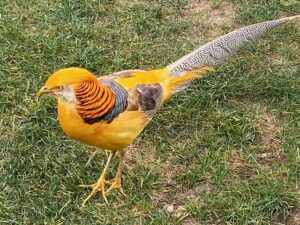
It was the day before The Day, “the day” being my arrival in Santiago de Compostela. I had been on the road—the dirt path mostly, the rocky trail sometimes, the paved road occasionally—since September 23. It was now October 25.
I could barely remember not being on the Camino, not waking before dawn and walking, my back to the sunrise, into the dark western horizon. Tomorrow it would come to an end. I was relieved. I wanted to sleep in a big bed in a room all by myself. I wanted to wear a pair of pants I had not worn every day for more than a month. I wanted to eat an enormous salad.
But I was also saddened. Tomorrow this tough but sublimely uncomplicated life, this single-focused, time-out-of-time, would end.
I had learned, I had delighted in, the fact that the monotony of the Camino was interrupted by surprises every single day. Some surprises were small, like coming upon the extravagantly feathered pheasants in the courtyard of little restaurant in Hospital de Orbigo. Some were big surprises, like today, the day before The Day.
Kiki and I had decided to walk all the way to Lavacolla, a very long day, because that would mean a short walk into Santiago the next morning. Morning was magic time. I wanted that for the arrival. Lavacolla, said Kiki (who knew everything—both her strength and her weakness), was where pilgrims of old stopped to cleanse themselves before entering the holiness of Santiago. Lavacolla could be translated as washing the colon. Or rectum. Or so she said.
We walked. Oh lordy, did we walk. The weather was unforgiving. Sheeting rain. Poncho–drenching rain. We arrived at the village in the late afternoon, soaked and starving, only to discover that the accommodation we had so carefully booked was not, in fact, located in the village of Lavacolla. We would need to walk another—really, I no longer remember—4, 5 kilometers. Uphill. Did I mention the rain?
When we finally crested the last hill and neared where the place supposedly was, it was dark. We saw nothing. No lights. No streets. No settlement. We were drenched. Am I belaboring the point? Perhaps. We finally happened upon the place, hidden down a dark path, unpromising, and presented our pitiful selves to the innkeeper.
The room was warm. The shower was hot. Miraculously, the hostel had a lovely restaurant, which Kiki later quite correctly called “needlessly amazing.” We splurged, ordering a huge pan of paella to share. And we bravely asked if the kitchen could make us pimientos de padrón for a starter (a dish both of us loved with a passion not normally associated with food). Yes, said our needlessly handsome waiter. We washed it all down with two glasses of very good vino tinto.
It was by far the best meal of the entire journey.
February 22, 2023 No Comments
The something of nothing
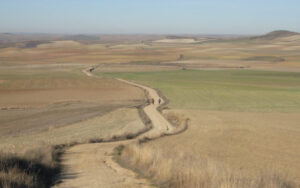
Ah, the meseta. The great interior plateau of the Iberian peninsula. Hot, dry, vast, solitary. It is day 14, although in truth I have stopped thinking of time like this. Each day on the Camino is its own perfect—or not-so-perfect–self-contained little narrative. Yet as the days continue, they begin to lose these hard edges. For all that they are distinct—the landscape, the weather, the people–they are the same: I awake in the dark, put on the same clothes, lace up the same shoes, heft the same backpack. Walk. Stop for café con leche. More than once. Eat the lunch I packed the night before, always the same: cheese, bread, red peppers. Walk some more. End the day sleeping in surroundings more humble than I ever could have imagined. Awake in the dark. Walk.
But leaving Burgos after an indulgent rest day, after a night luxuriating between crisp sheets in a private room, after a full day of day of wearing flip-flops and strolling through parks, the meseta now spreads out before me. And it is something else. Officially, the meseta runs from Burgos to Astorga, about 220K, but the heart of it, the vast nothingness of it, the bleak, flat, emptiness of it, runs maybe half that distance. These are long days of staring at far-off horizons and failing to see, often for many hours, a single sign of human habitation. These are days where a single tree in the distance takes on mirage quality, and you think: Is that a church steeple? Could that be a village? You walk three more hours and find out it is just a tree.
My first day of walking the meseta, from Burgos to an isolated albergue (aptly named the Oasis) is the most challenging 10 hours—yes, 10 hours–I’ve experienced so far. The walking itself is easy. The terrain is flat; the ground is solid. But the landscape is so overpoweringly empty, so seemingly endless, I lose a sense of myself. Of my actual body moving through space. If that sounds trippy, it’s because it is. It is both deeply discomforting and absolutely liberating. Sometimes simultaneously.
That day is half slog, half trance. I would like to report that as I trudged along I thought big thoughts. Or any thoughts. Or that insights and revelations flooded my sensory-deprived brain. Nope.
But I can report this: At the almost empty Oasis albergue, the owner invites me to sit on the little front porch that faces out to the nothingness and brings me a glass of cold water. Then he does my laundry and hangs it out on the line to dry. It comes back to me folded with a small shell necklace on top.
“No sane person fears nothingness.”
― The Tibetan Book of the Dead (yes, Uma’s father)
February 15, 2023 2 Comments
Camino magic
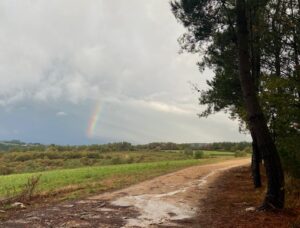
A charming man from the Netherlands operated a tiny tienda next to the albergue in Larrasoaña, my third stop on the Camino Frances. I ordered a café con leche at his place and listened, for the better part of an hour, to his stories. He had walked the Camino thirteen times, he told me. His stories had the air being oft-told, so it is possible that, over time, he had embroidered a bit. It seemed he had created a legend, modest though it was, around himself.
Nevertheless, I listened with great curiosity because I could not imagine why, with all the places in the world to explore, with all the extraordinary hikes through extraordinary landscapes, this guy would choose to walk the same 490 miles thirteen times. As I walked on, I met other repeat Camino pilgrims. Or heard first-timers vow they would return.
It was a mystery to me, this urge to repeat, this do-over mentality. Oh yes, the countryside was extraordinary as the path meandered across undulating plains, roamed through olive groves and vineyards, ventured across both arid flatlands and green rolling hills; as it traversed the cobblestone Calle Major of tiny villages both quaint and (no other way to say this) sorry-ass. The experience was extraordinary, a potent and often unexpected ping-ponging between daily grind and dazzling revelation. But do it again? And again?
Now more than three months since I returned from my trek, I think I understand. I think it is because those Camino lessons in simplicity, focus and clarity, in what matters and what doesn’t, in the camaraderie of souls, in delighting in the ebb and flow of life, those lessons learned while walking, those lessons you told yourself you’d never forget…they are damned hard to hold on to.
I remember thinking, so very many nights, sleeping between paper sheets or in a bunkbed or in a room of snorers “I’ll never take my quiet bedroom with my big bed and my flannel sheets for granted.” And then I did. Within days. ”I’ll never take an evening in front of the fire reading a book for granted.” And then I did. “I’ll never forget that you can be independent and interdependent simultaneously, that receiving help and being helpless are not at all the same, that things make sense when you stop trying so hard to make them make sense.” How to hold onto all this?
I think people walk again and again to recapture these moments, to relearn the lessons, to sink back into the magic. That’s what I am attempting with my writing.
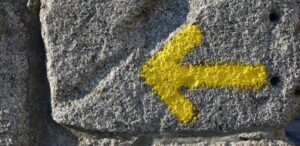
February 8, 2023 8 Comments
Invulnerability and cheap wine
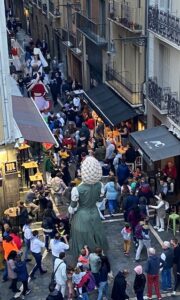
Day 3 of the Camino was supposed to be easy. I had walked 25 kilometers over the Pyrenees on my first day, starting at dawn, fueled by anxiety and wonder. On the second day, I walked 27.4—6 kilometers longer than the recommended stop—because I wanted to avoid replicating the prescribed “sections” in Camino guidebook everyone was using. I walked past Zubiri into Larrasoña, to the albergue where, that night, Tom appeared in my dream. And now day 3.
Piece of cake, I thought. Only 16.5 kilometers to Pamplona. And I would be meeting up with a new friend there, the “Kiki” you have read about in past essays. We had (kis)met in the afternoon of day 1, found each other unexpectedly on the path in the morning of day 2 (one of those “camino magic” moments), then separated as I walked on, but not before making a plan to meet up in Pamplona.
A short day. A stress-free day. I knew where I was going and where I was staying. A friendly face would be waiting.
Alas.
That was the day my oh-so-carefully enlightened (speaking of weight not spirituality) backpack began to dig into my unusually bony clavicle, the start of a painful bone bruise. That was the day I discovered my “international plan” from Verizon did not work in Spain (thus, map-less). That was the day I realized, upon entering Pamplona, that it was a feast day, that the Spaniards took their feast days mighty seriously, that the winding streets would be impassable, that I would spend three hours ass-to-elbow, backpack feeling like I was carrying rocks, lost and wandering, interrupting various raucous revelers to ask in broken Spanish if they knew the way to this little hotel, the name of which I had misremembered. That was the day I thought: Maybe I’m not as invincible as I thought I was. (Happily, that thought passed, as it is impossible to continue this journey without the shield of invulnerability)
When I finally found the hotel—okay I didn’t really find it…an extraordinarily kindly, gnarled, cane-wielding old lady walked me there—I discovered that the reservation I thought I had made I had not made. The place was full up. But the woman behind the desk took pity on me–I did, in fact, present as pitiful—and found me a windowless room the size of a prison cell, with a twin bed wedged against the wall. But the bed had two pillows. Two! And sheets. Real sheets made of fabric not paper. And a telephone-booth-sized private bathroom. With towels. It felt like a palace.
I dropped my backpack, unlaced my walking shoes, flopped on the bed, and vowed never to take the luxury and comfort of my life for granted ever again, a vow I kept for maybe 4 days after I returned to the luxury and comfort of my life.
Later I climbed the stairs to Kiki’s room where we got drunk on cheap wine sloshed into plastic cups.
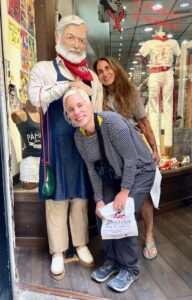
(Out and about, mixing it up with Papa, post-wine)
January 25, 2023 No Comments
I can do it myself
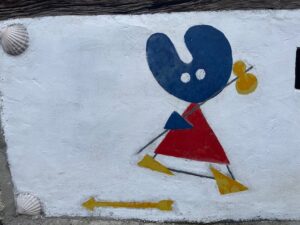
Kiki is reaching around into the side pocket of her backpack to grab her poncho. It is pouring rain. No, it is sheeting rain. It is blinding rain. It is rain coming at us sideways. We’re standing off to the side of the path, somewhere between Rabinal and Ponferrado or maybe just outside Triacastela. I don’t remember. I remember the rain. I remember starting to help Kiki grab the poncho. I remember her telling me, no, I’ve got it. I can do it myself. And I remember thinking: Yes, I know you can do it yourself. That’s not why I am offering.
In that moment, I saw myself so clearly it just about floored me. Kiki was the mirror.
I was the one who almost always refused help. I was the one who conflated being helped with being helpless, who interpreted an offer of assistance as a criticism of my abilities. “I can do it myself” had pretty much been my motto for as long as I could remember. Sometimes it takes someone else doing just what you have done, saying just what you would have said, to shake you awake.
It occurred to me, there in the downpour, in the mud, at the tail end of a tough day, while watching my companion struggle (successfully, of course) to extract the poncho from the pocket of her backpack, that when someone offers help it may have absolutely nothing to do with whether they think you’re capable of handling the situation by yourself.
I knew Kiki was capable. I had seen her grab the poncho a dozen times or more. I offered my help to be of service, to perform a small act of kindness, to show friendship, to connect in the moment. When Kiki refused (as I had so many times refused such offers)—I can do it myself!—she was not just proclaiming her self-sufficiency, she was depriving me of this opportunity to be a friend. Of course she didn’t do it for that reason, or knowingly, just as I had not all those many times I had refused such offers.
Lesson learned? I am trying.
January 18, 2023 9 Comments
Go
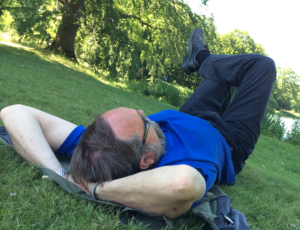
Day 3 of the Camino and I knew nothing. I had yet to learn that I carried too much water and not enough food, that the revered Brierley–the guidebook everyone used–could be full of shit, that the trail would be kinder and crueler than I ever imagined, that, among those I randomly encountered, I would meet una amiga de mi alma. Also: I didn’t know if I could do this thing. I didn’t know if I wanted to do this thing.
On day 3 I found myself in Larrasoaña, a small village, at an albergue chosen without the thought I’d later learn to devote to decisions about where I would sleep. The host directed me to a room on the second floor with 4 sets of metal bunkbeds that would eventually be inhabited by 8 people, all women. I thought same-sex rooms was the usual thing. I didn’t know that this would never happen again. We women shared a bathroom, which was clean and had new bar of soap and a tiled shower with abundant hot water. I thought this was the usual thing. I didn’t know this would never happen again.
Clean, clueless and concerned, I tucked myself into the bottom bunk below Michele from Quebec who was busy writing in her journal (which it occurred to me I should be doing, but I hadn’t brought a notebook in a wrong-headed attempt to save backpack weight) and across from Margit from Sweden who was bandaging her already blistered toes. In this room full of women—not one of whom snored–I fell asleep easily. This would not again happen.
That night I had a dream so real, so palpable, that when I awoke I was convinced it had actually happened. In the dream Tom knelt beside the bunkbed, reached in and touched my shoulder. I felt that touch. I got out of bed. I stood up. And we embraced, the kind of full-body embrace that lasts long enough for you to feel the other person’s body heat. I felt that embrace. I felt that heat. Then we stood apart. “Go,” he said.
When you dream, your subconscious is trying to tell you something. When you dream of people who have died, you pay close attention. My dreams are often embarrassingly obvious. Once I dreamt I hit my father over the head with a frying pan. Like that.
“Go,” said Tom, who was for three decades my husband. And I did.
January 11, 2023 8 Comments





